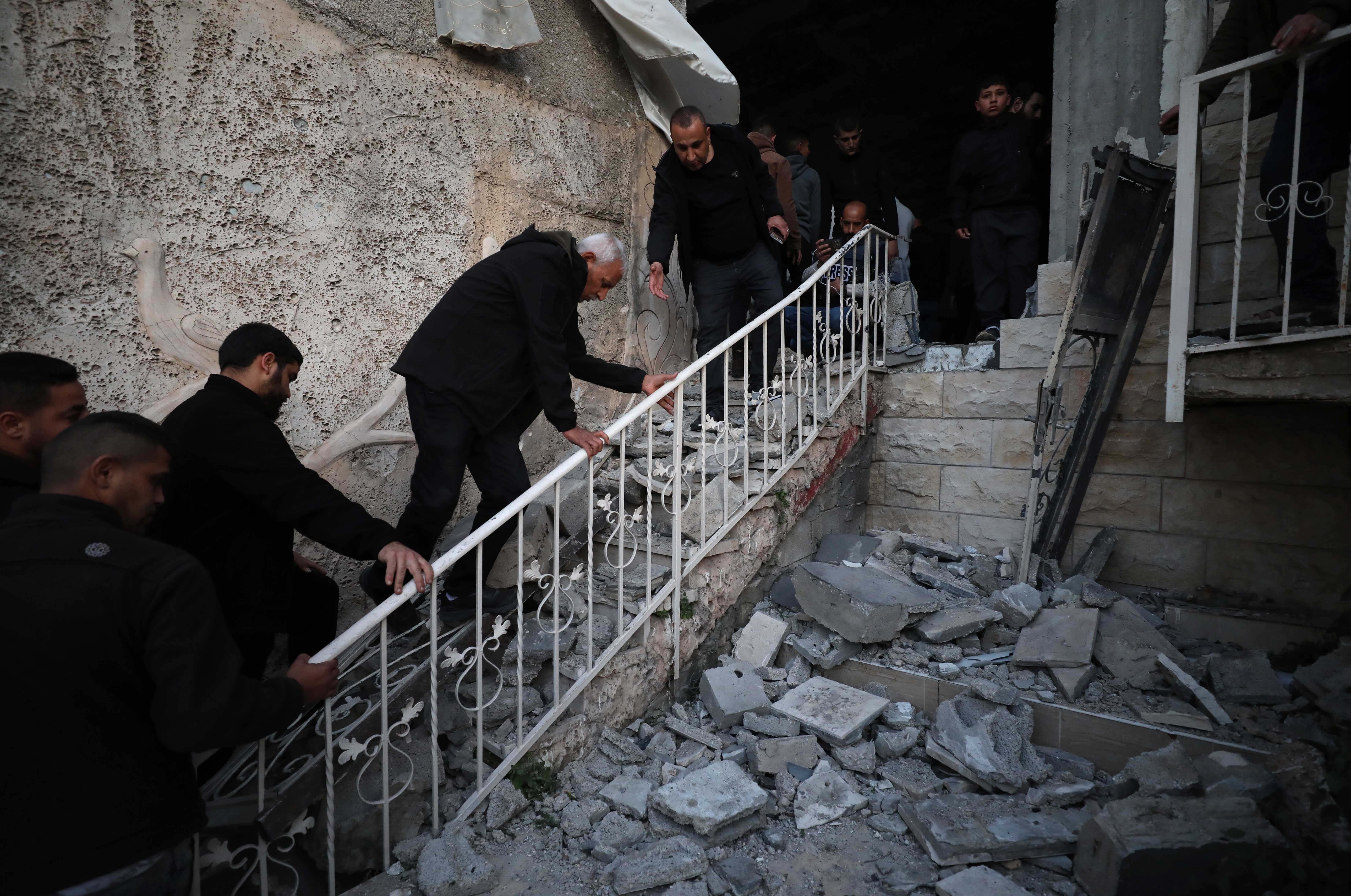Palestine issue: More must be done
- By Jin Liangxiang
 0 Comment(s)
0 Comment(s) Print
Print E-mail China.org.cn, March 9, 2023
E-mail China.org.cn, March 9, 2023
Palestinians check a damaged building after an attack on March 8, 2023. [Photo/Xinhua]
Palestine has seen devastating incursions by Israeli settlers and armed Israeli forces in the last couple of months in Jenin and Nablus as tens of Palestinians were killed and thousands affected. The latest tensions reflect not only old conflicts, but also changes in Palestine's internal problems, Israeli policy, the reduced attention of regional and global actors, and the dysfunction of international organizations. If measures are not taken to reverse the current trends, the world will sooner or later see the issue come to a head.
The Palestine issue, which is often described as a conflict between Israel and Palestine, is fundamentally about Israel's annexation of territories slated for Palestine in various U.N. resolutions. Israel is reluctant to negotiate a solution with the Palestinian Authority (PA) as it is in a favorable position and is supported by the United States.
Albeit an old conflict, the issue includes various new changes and challenges. First, the PA has been seriously weakened. The regular operation of the PA as the recognized government of Palestine by the international community is a precondition of any political solution and management of the issue. Unfortunately, the PA has been facing financial problems because Gulf countries, including Saudi Arabia, suspended their donations in recent years, while Israel has withheld revenue that should be given to Palestine.
Financial deficit, in addition to a poor security situation, has made it very difficult for the PA to provide even modest governance, or conduct any of the processes necessary to construct its political legitimacy. These problems make it more difficult for the PA to manage its internal affairs, including controlling various security apparatus.
Second, Israel is becoming more hawkish with regards to its policy on the Palestine issue. The effective running of the PA should be a precondition for maintaining stable Israel-Palestine relations and ensuring Israel's security interests, but there is no evidence that the Israeli side is aware of that. As such, various Israeli governments have persistently adopted policies squeezing the PA's legitimacy. Benjamin Netanyahu returned to power in late 2022 with right wing politicians and religious factions, and adopted even more hawkish policies against the PA such as withholding Palestinian revenues, annexing Palestine's territories and conducting military operations on Palestinian land.
Third, Palestinians' Arab brothers are demonstrating growing disinterest toward assisting the PA. The Trump administration had coordinated the normalization of relations between Israel and a number of Arab countries, and it seems that the process will not be hampered by the tensions between Israel and Palestine. Saudi Arabia and other major donors were dissatisfied with the PA's opposition to the Abraham Accords and so suspended their donations, which has been a major contributor to the PA's financial problems. Meanwhile, Gulf countries are concerned about a threat from Iran, and will be motivated to strengthen their security cooperation with Israel, which will make Israel free to take even tougher actions on Palestine.
Fourth, the roles of international organizations are modest. Major global organizations including the United Nations and European Union support the legitimate request for nationhood, but their roles are limited. The United Nations, while putting out small fires and organizing assistance, cannot play a meaningful role unless the U.S. allows it. The EU is concerned about the Palestine issue, but it is unable to overcome its internal divisions. Neither of the two nor other organizations can play meaningful roles.
In short, the Palestine issue is facing new realities in addition to old problems. Judging by the current situation, the world will likely see the issue developing in three directions. First, the PA will be further weakened due to financial problems and lack of political legitimacy. Then, the Palestine issue could also be further marginalized due to regional disinterest and indifference. Next, tensions between Israel and Palestine will escalate in a serious manner due to Israel's hardline policy, the rise of armed groups within Palestine and the frequent conflicts and frustrations on the Palestinian side.
It might be true that the Palestine issue is being marginalized, but that does not mean the issue is losing its regional and global implications. On the contrary, if not solved or managed reasonably, tensions could easily spread beyond the Israel-Palestine front and the Middle East region as Muslims across the world are still emotionally attached to the grievances of their brothers.
The Ukraine crisis is occupying the front pages of global media together with other major international issues. However, the world should not forget the suffering of Palestinians as their frustrations could have destructive effects across the world. Only the United States has leverage on Israel, and should particularly reverse its policy of over-protecting Israel. Not only does this serve the interests of the region, but also the image building of the U.S. itself.
Jin Liangxiang is Senior Research Fellow with the Center for West Asian and African Studies, Shanghai Institutes for International Studies. For more information please visit:
http://91dzs.com/opinion/jinliangxiang.htm
Opinion articles reflect the views of their authors, not necessarily those of China.org.cn.
If you would like to contribute, please contact us at opinion@china.org.cn.






